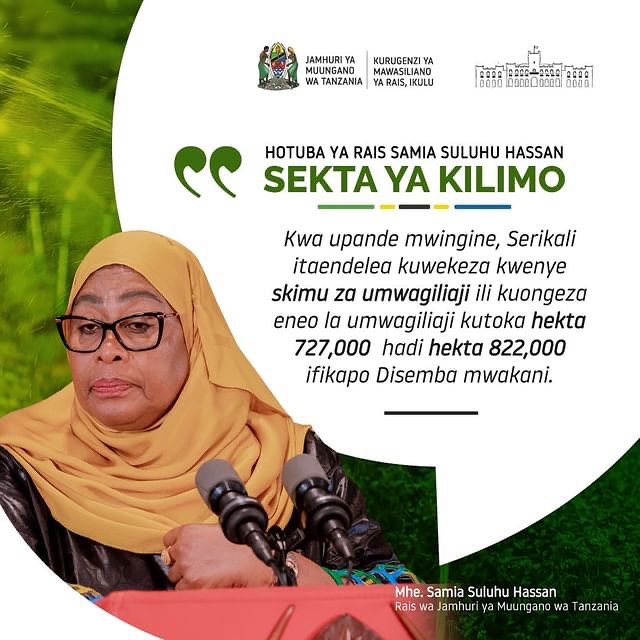Expanding Tanzania’s Soybean Sector: A Strategic Collaboration for Growth and Innovation
The Southern Agricultural Growth Corridor of Tanzania (SAGCOT), an initiative dedicated to enhancing agricultural productivity and sustainability, has recently taken a significant step in bolstering the soybean sector in Tanzania.
The Strategic Importance of Soybeans in Tanzania: Maria Ijumba, the Head of Hub Development and Domestic Partnership at SAGCOT, emphasized the critical role of soybeans in the Tanzanian economy and its potential for growth. Soybeans, known for their high protein content and soil-enriching properties, offer a dual advantage: improving human and animal health and enhancing agricultural sustainability. Recognizing this potential, SAGCOT’s initiative aims to tap into these benefits by increasing soybean production to meet the rising domestic demand.
Collaborative Efforts for a Sustainable Value Chain The initiative’s core strategy is to foster collaboration among various sectors. Representatives from the private sector, development agencies, and government ministries, including Agriculture, Livestock, and Industry and Trade, came together under SAGCOT’s coordination. This multi-sectoral approach is expected to create a comprehensive and sustainable soybean value chain that not only supports large-scale producers but also empowers small-scale farmers.
One of the meeting’s key discussions revolved around improving production and processing capabilities in the soybean sector. The focus was on developing strategies to ensure the availability of high-quality seeds, efficient processing techniques, and support mechanisms that enable farmers to produce soybeans more effectively and profitably.
Research and Development: The Backbone of Innovation
Significantly, Meshack Makenge from the Tanzania Agricultural Research Institute (TARI) highlighted the institute’s role in developing disease-resistant soybean varieties. These innovations, showcasing Tanzania’s commitment to agricultural research and development, are pivotal in ensuring that the soybean crops can withstand local challenges and yield high production.
The Value Proposition: Beyond Agriculture
The expansion of the soybean sector in Tanzania is not just an agricultural endeavor but also a socio-economic one. By increasing soybean production, Tanzania can reduce its dependency on imports, bolster its food security, and create job opportunities across the value chain. Moreover, the high protein content of soybeans can play a crucial role in combating malnutrition, a persistent challenge in many regions.
The Vision for a Robust Soybean Industry in Tanzania
As Tanzania navigates the path to agricultural modernization, the development of the soybean sector stands as a beacon of potential and prosperity. The recent collaboration initiated by the Southern Agricultural Growth Corridor of Tanzania (SAGCOT) marks a pivotal moment in this journey, aiming to transform the soybean industry into a cornerstone of economic and social development.
Strategic Collaboration: A Multi-Dimensional Approach
The approach adopted by SAGCOT is multidimensional, engaging various stakeholders to create a robust ecosystem for soybean growth. This collaboration goes beyond mere agricultural production; it envisions a holistic value chain development encompassing research, seed development, cultivation, processing, and market linkages.
1. Research and Innovation:
The role of institutions like the Tanzania Agricultural Research Institute (TARI) is crucial in this framework. By developing disease-resistant and high-yield soybean varieties, TARI is setting the stage for a revolution in soybean cultivation, tailored to Tanzania’s unique climatic and soil conditions.
2. Empowering Small-scale Farmers:
The initiative places significant emphasis on smallholder farmers, who form the backbone of Tanzania’s agricultural sector. By providing access to quality seeds, training in sustainable farming practices, and ensuring market access, the project aims to uplift the livelihoods of these farmers, transforming them into key players in the soybean value chain.
3. Enhancing Processing and Value Addition:
To maximize the economic benefits of soybean production, focus is also being placed on processing and value addition. Developing local processing facilities not only creates job opportunities but also ensures that a larger portion of the soybean value is retained within the country.
The Economic and Social Impact
A Boost to Food Security:
Increased soybean production directly contributes to food security. As a protein-rich crop, soybeans can play a critical role in addressing nutritional deficiencies, particularly in rural areas.
Economic Diversification:
The soybean sector presents an opportunity for Tanzania to diversify its agricultural portfolio. This diversification is key to building a resilient economy, capable of withstanding global market fluctuations.
Job Creation and Gender Empowerment:
The expansion of the soybean industry is expected to create numerous jobs across its value chain. Moreover, it opens up opportunities for women, who are integral to agricultural activities in Tanzania, thereby contributing to gender empowerment and equality.
The Road Ahead: Challenges and Opportunities
While the prospects are promising, challenges such as climate change, fluctuating market demands, and the need for continuous technological advancement remain. Addressing these challenges requires sustained effort, innovation, and adaptation.
A Model for Sustainable Agricultural Growth
SAGCOT’s initiative to develop the soybean sector in Tanzania is more than just an agricultural project; it is a model for sustainable growth, integrating economic viability with social responsibility and environmental stewardship. As this project moves forward, it stands as a testament to the power of collaborative effort and strategic planning in transforming the agricultural landscape of a nation.


